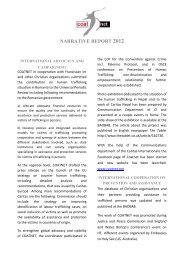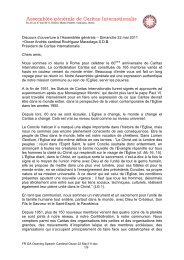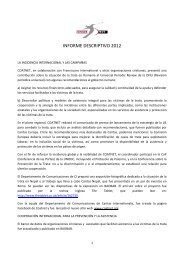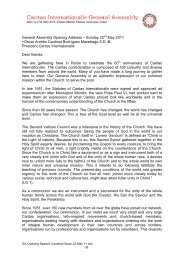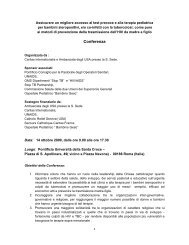"Caritas: the practice of Love by the Church as a "Community of Love"
"Caritas: the practice of Love by the Church as a "Community of Love"
"Caritas: the practice of Love by the Church as a "Community of Love"
You also want an ePaper? Increase the reach of your titles
YUMPU automatically turns print PDFs into web optimized ePapers that Google loves.
and completely uniform, should never<strong>the</strong>less be carried on in an orderly f<strong>as</strong>hion in dioceses,<br />
nations, and throughout <strong>the</strong> entire world...” (GS no. 88).<br />
Regarding coordination with <strong>the</strong> charitable organisations <strong>of</strong> <strong>the</strong> <strong>Church</strong>, it should be<br />
emph<strong>as</strong>ised that our activity is guided <strong>by</strong> <strong>the</strong> principle <strong>of</strong> <strong>the</strong> integral development <strong>of</strong> <strong>the</strong> human<br />
person. Therefore, it is not merely philanthropic and humanitarian <strong>as</strong>sistance aimed at relieving a<br />
certain kind <strong>of</strong> distress, but also and above all it entails giving back to human persons all <strong>the</strong>ir<br />
dignity <strong>as</strong> children <strong>of</strong> God, and promoting an anthropology that also encomp<strong>as</strong>ses <strong>the</strong> religious<br />
dimension <strong>of</strong> human persons, namely <strong>the</strong>ir encounter with God.<br />
In his Encyclical Populorum progressio, published in 1967, Pope Paul VI w<strong>as</strong> already<br />
illuminating <strong>the</strong> great <strong>the</strong>me <strong>of</strong> <strong>the</strong> development <strong>of</strong> peoples, <strong>the</strong> splendour <strong>of</strong> truth and <strong>the</strong> gentle<br />
light <strong>of</strong> Christ’s Charity. “He taught that life in Christ is <strong>the</strong> first and principal factor <strong>of</strong><br />
development and he entrusted us with <strong>the</strong> t<strong>as</strong>k <strong>of</strong> travelling <strong>the</strong> path <strong>of</strong> development with all our<br />
heart and all our intelligence, that is to say with <strong>the</strong> ardour <strong>of</strong> charity and <strong>the</strong> wisdom <strong>of</strong> truth. It is<br />
<strong>the</strong> primordial truth <strong>of</strong> God's love, grace bestowed upon us, that opens our lives to gift and makes it<br />
possible to hope for a “development <strong>of</strong> <strong>the</strong> whole man and <strong>of</strong> all men” (Pope Benedict XVI, <strong>Carit<strong>as</strong></strong><br />
in veritate no. 8)<br />
The fundamental document for us is <strong>the</strong> Encyclical Deus <strong>Carit<strong>as</strong></strong> est. Published in 2005, it<br />
presents an <strong>of</strong>ficial doctrine on charity for <strong>the</strong> first time. For Pope Benedict XVI, <strong>the</strong> imperative and<br />
<strong>practice</strong> <strong>of</strong> charity, love <strong>of</strong> one’s neighbour, are vitally important. The <strong>Church</strong> cannot renounce her<br />
proclamation, even though nowadays, at le<strong>as</strong>t in <strong>the</strong> Western world, a humanism without God<br />
seems to have become an integral and l<strong>as</strong>ting part <strong>of</strong> <strong>the</strong> prevailing culture. Pope Jean Paul II spoke<br />
bitterly <strong>of</strong> countries where religion and <strong>the</strong> Christian life were once flourishing absolutely and<br />
capable <strong>of</strong> generating communities <strong>of</strong> living and active faith, which today have been radically<br />
transformed <strong>by</strong> <strong>the</strong> incessant spread <strong>of</strong> religious indifference, secularisation and a<strong>the</strong>ism. This<br />
particularly concerns <strong>the</strong> nations <strong>of</strong> what is called <strong>the</strong> First World, where economic wellbeing and<br />
<strong>the</strong> rush to consume inspire and nourish a life lived “<strong>as</strong> if God didn't exist”. Currently, faced with<br />
<strong>the</strong> serious problems <strong>of</strong> life, religious indifference and <strong>the</strong> total lack <strong>of</strong> meaning that is attributed to<br />
God are no less worrying nor deleterious than overt a<strong>the</strong>ism. Toge<strong>the</strong>r with enormous material,<br />
scientific and technological progress, <strong>the</strong> West is now experiencing a serious moral regression and a<br />
gradual “silent apost<strong>as</strong>y” (cf. Christifideles Laici, no. 34). Undoubtedly, since <strong>the</strong> beginning <strong>of</strong> his<br />
papacy, Pope Benedict XVI h<strong>as</strong> considered this “religious indifference” and “silent apost<strong>as</strong>y” <strong>as</strong> <strong>the</strong><br />
major challenge <strong>the</strong> <strong>Church</strong> h<strong>as</strong> to take up today in her relations with <strong>the</strong> modern world. Therefore,<br />
he is more determined than ever to make our minds more aware and our faith more visible and more<br />
2




